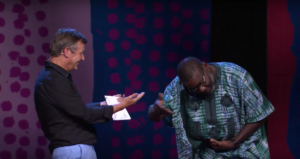This piece has some resonance with the just concluded Ekiti elections. It is a cautionary tale that underscores the need for a tactile kind of empathy with the people.
Recently, I paid an unscheduled visit to a state owned general hospital. Mercifully the visit was not for treatment but to make some inquiries; either way, I don`t like hospitals.
Even from the main gate, (which was a good distance away from the out-patient department) I could perceive faintly that characteristic smell of all hospitals.
And its redolence evoked in my mind a searing excruciating montage of pain, disease and suffering. I was not to be disappointed for as I approached the main buildings, a fourth dimension was added, poverty.
A general hospital I remembered (and as the same implies) is the hospital for the general public, which largely means the poor and underprivileged. Walking through a sea of bleak faces and heading towards the out-patient department I stumbled across the department of obstetrics and gynaecology. I paused briefly to take in the painful rows of heavily ladened women queueing up to collect their respective prescriptions from a dingy looking counter which housed the dispensary.
Through the windows of some of the wards, I could see women supine and in various stages of undress and pregnancy, all looking disconsolate. The “joys of motherhood” isn’t supposed to be like this, I imagined. Moving on past an equally dismal male ward the “hospital” small strengthens as I approach the out-patient department.
And as I entered the large rectangular building that serves as the waiting room, the sights, smells and sounds of my imagination collided head on with the stark grim realities that that served as its inspiration. The collision was deafening, and I was immediately engulfed and overwhelmed by the assault on my sensibilities.
Nasally, the smell of iodine and disinfectant mixed with the primal odour of sweat and excreta sent my head reeling.
Visually the regimented rows of people sitting or lying on benches their undernourished bodies racked by pain and disease (of all description) cowering before the orders of a diminutive but dictatorial matron was like an absurd enactment of purgatory.
And the aura assaults of moans of great discomfort, howls of sheer pain, and sighs of utter hopelessness, added an audible quality to what in my mind seemed to be a stygian nightmare.
I broke out of the trance and instinctively made for the exit; out of the corral and in the open, it was less stifling. A man hobbled past me, his left leg in a dirty and blooded P.O.P. cast, his right hand gripping tenaciously for support, what at one time must have been a leg and back support of a chair.
A teenage girl turned to face me, her neck bloated with a goiter. Another woman looked up at me from the floor where she was sitting, her eyes a deep yellow and her face a study of suffering. I must have looked alien (indeed I was) or maybe I was paranoid because everybody there was staring at me.
Looking rather well-fed in a well-cut French suit, and clutching a black attaché-case, a picture of good health and good food, I easily belonged to another species entirely. It was clear even to me that I did not belong, I was alien. Ironically I had lost touch with the very people I had imagined I crusaded for. To be sure I still strongly empathized with them, but somehow they had been reduced in my calculations to just statistics. The so called masses as they are usually referred to.
It is all too easy as I have discovered to be out of touch with the actual suffering and hardship of many of our compatriots. And the higher you go up the class ladder, the more likely you are to evolve into an alien.
Playing the devil`s advocate (quite literally) I can now begin to understand why Umaru Dikko believed that unless people rummaged through dustbins they weren’t hungry. And why Shagari seemed so insensitive to the aspirations and demands (by right) of Nigerians. At the very top, the bottom seems so far removed. Out of sight is easily out of mind.
But history stands firm by the people; and any leadership that wittingly or unwittingly loses touch with the people it professes to govern eventually pays the price for its alienation.
Prices have skyrocketed since December 1983, corruption and favouritism are still rampant in high places, the rich are getting richer and the poor poorer, and everything is going on like before, it is as if nothing has changed. It is very dangerous to lose touch.
The Punch, Saturday, APRIL 7, 1984



